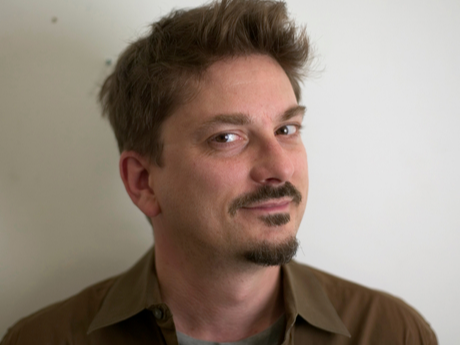In Their Own Words
Scott Zieher's “What to Want”

What to Want
An inkling of silence through unending afternoon.
Encomiums for all the old men on the corner or the porch—
All those of amplitude modulation
In the maundy maundy anno mundi eight million.
The heavy staff of sweet medicine.
Many pages of peace and no Wounded Knee or Cushing the Zuni.
Consistency of surprise and bedevilments without botheration.
Sharp dark pencils.
Curiosity without insecurity.
Clean slates.
Out of state plates.
Stamps.
Untempered blessedness.
Latticework around high story windows above the heavy bustle.
No more than five dollars ever.
A tunnel from tomb to tomb and a grandfatherly gold fedora.
No news.
Free ability to abort and procreative hesitation.
Humpback-back-door curves.
Uncruel veal.
A modicum of delirium.
Work.
True umber plains with unflinching green relief.
No reservations.
Early style stadium bleacher benches under-littered with confetti.
Comeuppance for architects.
Ancestor worship and living proof.
Music from 1962.
Breakfast at cold apple dawn.
A day's worth of belly.
Impala god speed from the freeway.
A list of your own.
Loose pantaloons.
Such rugged blood from the patina eagle deep— flagpole in the park.
A tall glass bottle of Coke.
No timepiece as anathema.
The smell of a cedar chest full of embroidered linens.
Enough moxie for the foxtrot.
Three star prayer for all souls floating over our bloated dome.
Whitmanic depression.
Comeuppance for poets.
No formula for the fecundity at your fingertips.
No basement full of chains.
No yanking back the reigns.
No stalling.
All forward.
From What to Want (Ampersand Editions, 2014). Reprinted with the permission of the author.
On "What to Want"
This was written in Brooklyn in 1996 and 1997, shortly after getting my MFA from Columbia. As it took shape, I was seeking some kind of employment; teaching jobs were impossible to come by and I eventually took a position as an administrator for a financial services company on Water Street, very close to the bottommost point on the island of Manhattan. I had a small portrait of T.S. Eliot smoking a cigarette on my desk, framed in mauve, taken when he was with Lloyds Bank and doing the most important writing of his life. A lot of the brokers thought this 80 year old photograph was actually me, or my father. My boss hired me at first because he thought I had an MBA from Columbia. He turned out to be an incredible ally, his nickname was Touchdown. I would stroll home to East 16th Street through the oldest parts of the island, and kept in mind the relatively adverse scenario of my day job shouldn't have any bearing on my imagination. There was a gym in the basement of my day job and I was taking boxing classes on my lunch hour or going to the Customs House which is the National Museum of the American Indian. I started looking into scripophily and started making art in earnest. It was good having a solid paycheck. When I wrote this poem the material world was full for me, I was listing what could be improved ideally.
I've always been keen on lists, and this was my first sustained investigation of the technique. Many times I returned to this poem thinking it should be book length— there's so much worth seeking— but I recognized brevity worked better here and have essentially built a platform around the idea for thirteen book length poems, of which I've written five and published three. My hope herein was not to have a list of material items (notwithstanding, sharp pencils, stamps, out of state plates, which were mostly meant to encourage the writing impulse)— this was a list of what to want as a poet. Hence "Whitmanic depression"— meant to be playful, but I was reading the 1855 Leaves of Grass and Melville at the time, and lamenting their own search for purity, not to mention their long gone old world. Meanwhile, the day job was giving me life lessons through osmosis, I was learning to be a salesman (like my father before me) all while administering a program (like my mother before me), two things I have to do today as an art dealer. This poem was a turning point for me, breaking though a comparably formal investigation and simultaneously finding a broad path ahead.
Despite a non-linear angle, the voice feels very plain spoken to me, nearly 20 years later. These are things I wanted: Peace, as in silence and succor, knowing all the while actual, sustainable, peace sign freedom is absolutely impossible in this world. The lines are therefore sort of like little moments of recognition. Moments like "No Cushing the Zuni" meaning: if only America had never needed an anthropologist to go live like a novelty "savage" to understand what we'd destroyed in this country. There's a bitter undercurrent in this relatively optimistic, young voice. I don't seek comeuppance anymore; but the idea of timepieces as anathema— I think there's something to be said about unbridled enthusiasm— only time whittles that exuberance down, and, nearly 20 years later I hope most of the forward thought is still dear to me. And somehow a timepiece seems almost obsolete in an age when we can receive phone calls with our cameras and carry typewriters in our pockets. I try not to take things so seriously. The world is ludicrous. Now that I have children I'd like to impart some sense of understanding that while working toward leading the semblance of a happy life, we should want the right things, cherish our memories, work toward awareness, and pay attention.


